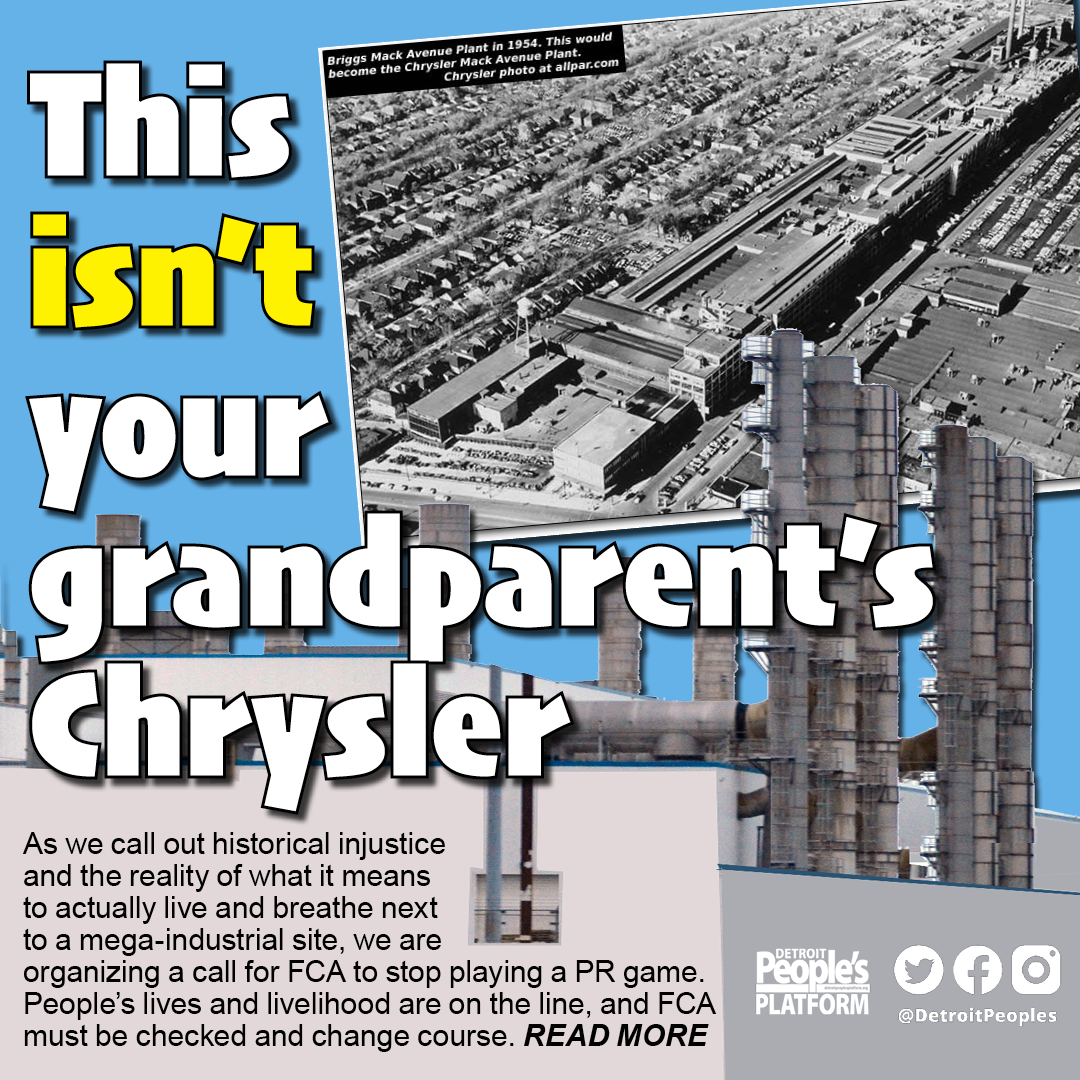On Monday, December 7th the city will host the first annual report of the Fiat Chrysler (FCA) Community Benefit Agreement for the Jefferson Avenue Plant expansion. The meeting fulfills a requirement of the Community Benefits Agreement (CBA) signed by the Neighborhood Advisory Council (NAC) in April of 2019.
Since the project was announced residents have demanded reduced emissions, better environmental protections and more money for adjacent residents to make their homes safe to live in. They have not been heard over the constant reference to promised jobs and Chrysler’s self-aggrandizing public relations campaign. The focus on jobs feeds into many Detroiters affinity for and identification with being ‘the motor city’.
Many in Detroit and Southeastern Michigan have family connections to the automakers; the Big Three. Ford, GM and Chrysler provided union jobs and made it possible for Detroit to become a city where Black home ownership hit record numbers. Until the car makers abandoned the city employment in the auto industry greatly expanded the Black middle class. This made it possible for many Detroiters to attend college and find opportunity in other industries. These gains were hard won in part by efforts of the labor movement, in spite of the Big Three.
Yet many feel a debt and connection to Chrysler. But we can’t look past the changes in the company since ‘the good ol’ days’. This isn’t your grandparent’s Chrysler. This is Fiat-Chrysler; FCA, a global player worth billions. The company is merging with French-rivals PSA to become an entity called STELLANTIS. Registered in the Netherlands, STELLANTIS will include 14 brands: Abarth, Alfa Romeo, Chrysler, Citroën, Dodge, DS, Fiat, Jeep, Lancia, Maserati, Opel, Peugeot, Ram and Vauxhall.
Detroiters and people everywhere need jobs. However, jobs should be an outcome of successful business and equitable economic development. Jobs shouldn’t be positioned as an excuse or cover for injustice. The emphasis on jobs coming from the media, the administration, City Council, FCA and the Public Relations group FCA have hired is misleading.
Again, while these jobs have benefits, some pay just a little more than $15 an hour. They are NOT the same jobs that supported a Black middle class, sent kids to good colleges or created intergenerational wealth. The actual number of Detroit hires has been contested and FCA have yet to ‘show their work’ on the jobs numbers they’ve touted. This is NOT your grandparent’s Chrysler.
The Labor Movement’s struggle with the ‘Big Three’ and other industries reminds us that the myth of the beneficent corporation is just that, a myth, especially for Black employees and frontline communities. As we call out historical injustice and the reality of what it means to actually live and breathe next to a mega-industrial site, we are organizing a call for FCA to stop playing a PR game. People’s lives and livelihood are on the line, and FCA must be checked and change course. Again, this is not your grandparent’s Chrysler. This isn’t even Eminem’s Chrysler.
In reality, Chrysler was never great. Many long-time labor activist and factory workers will attest to that. But now the tables are turned and we, taxpayers in Detroit as well as the rest of Michigan are being made to cover nearly half the cost of this project. FCA has been approved for over $400 Million in public funding while they just posted $1.4 Billion net profits in the 3rd quarter alone this year, during a pandemic.
For nearly two years residents close to the plant, across the city and throughout the region and state have demanded FCA reduce facility emissions with improved air pollution control technology, increase environmental protections for residents and provide more money for adjacent residents to make their homes safe to live in.
At any time, Fiat Chrysler can revisit the Community Benefits Agreement (CBA) or negotiate a new CBA that addresses and corrects the economic and environmental injustice embedded in this process. Great or not, this isn’t your grandparent's Chrysler, and Detroiters need to stop treating them like they are, hold them accountable and demand more.
